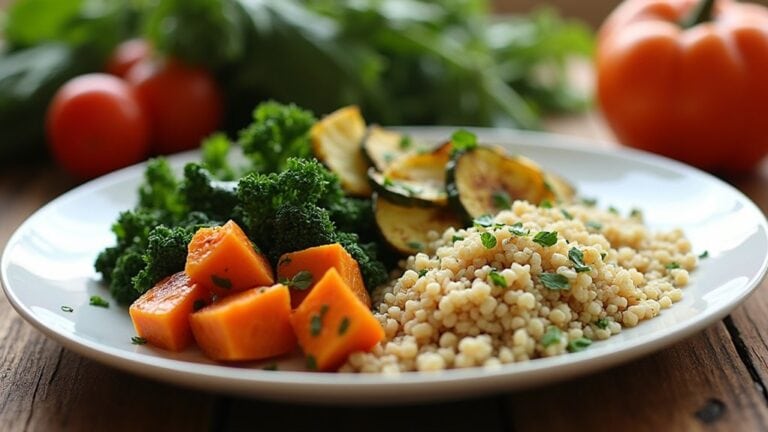Dried mango is not just a tasty treat; it packs a powerful punch of health benefits. It enhances the immune system with essential vitamins and antioxidants while promoting eye health and supporting digestion through fiber. This snack is also a clever ally in weight management and blood sugar control. With its rich mix of nutrients and cancer-fighting polyphenols, dried mango fits beautifully into diverse diets. Curious how it does all this? We should examine its enticing attributes further.
Immune Support From Vitamins and Antioxidants
At times pondering methods to strengthen the immune system, one could not instantly consider the modest dried mango, yet this tasty fruit provides a wealth of vitamins and antioxidants that can play a crucial role in sustaining general health.
A 40g serving delivers 19% of the daily value of vitamin C, critical for immune cell function and fighting infections. Additionally, the antioxidants, including beta carotene and luteoxanthin, help neutralize free radicals, which could otherwise weaken immune defenses.
Rich in polyphenols like mangiferin, dried mango can lower inflammation markers markedly, enhancing immune regulation. Moreover, it supplies folate for white blood cell production and vitamin A, which maintains mucosal barriers, fortifying the body’s defenses against pathogens effectively. Incorporating antioxidant-rich foods like dried mango into your diet can further bolster your immune resilience.
Eye Health Benefits of Vitamin A
Dried mango is not just a delicious snack; it’s also a source of Vitamin A, which plays a crucial role in maintaining vision clarity and preventing eye issues as we age.
With regular consumption, the beta-carotene found in dried mango can help safeguard against conditions like age-related macular degeneration while supporting comprehensive eye health.
Integrating this tasty treat into a well-rounded diet can boost nutrient harmony with other foods, promoting even greater benefits for the eyes.
Vision Maintenance and Clarity
Maintaining good vision is essential for moving through the world with clarity and confidence, so adding dried mango into one’s diet can offer unique benefits for eye health. This tropical fruit contains vitamin A, which plays a vital role in the production of rhodopsin, enhancing low-light vision.
The beta-carotene in dried mango helps protect against xerophthalmia and corneal ulcers through converting into vitamin A. Additionally, the antioxidants lutein and zeaxanthin found in mango might help mitigate the risk of age-related macular degeneration.
Research indicates that mango consumers have higher macular pigment density, leading to better retinal protection. Through integrating dried mango into daily meals, individuals can enjoy strong vision support and improved general eye health.
Preventing Age-Related Degeneration
As one ages, the significance of preserving eye health can become even more pronounced, particularly given the rising prevalence of age-related eye conditions. Dried mango, abundant in vitamin A and beta-carotene, supports retinal function and guards against issues like night blindness and age-related macular degeneration (AMD). Research indicates that consuming sufficient vitamin A can reduce AMD risk by 25% in adults over 50. Additionally, dried mango contains lutein and zeaxanthin, which help filter harmful blue light, thereby enhancing macular health. Regular inclusion of this tasty fruit might also slow cataract progression, offering a blend of health benefits that are vital for maintaining sight.
| Nutrient | Benefits |
|---|---|
| Vitamin A | Supports retinal function |
| Beta-Carotene | Converts to vitamin A, protects against AMD |
| Lutein | Filters blue light, preserves macular health |
| Zeaxanthin | Protects against light-induced damage |
| Dietary Fiber | Supports general eye and visual health |
Nutrient Synergy With Other Foods
Understanding how to boost nutrient absorption can significantly increase the impact of dried mango on eye health. Pairing dried mango with healthy fats, such as almonds, can improve vitamin A uptake by up to 30%.
If eaten alongside vitamin C-rich foods like oranges, the antioxidant benefits of vitamin A are heightened, encouraging superior eye protection. Additionally, the beta-carotene in dried mango collaborates effectively with zinc-rich foods, like pumpkin seeds, to aid conversion to active vitamin A.
It’s also worth noting that mixing dried mango with omega-3s from walnuts could effectively alleviate dry eye symptoms. Finally, adding lutein from leafy greens together with dried mango might guard against macular degeneration, reinforcing its role in a nutrient-rich diet for peak visual health.
Weight Management With High Fiber Content
Integrating high-fiber foods into one’s diet is a smart move for those looking to manage their weight effectively. Dried mango, with its dietary fiber content, serves as an excellent high-fiber snack that promotes satiety through keeping individuals feeling fuller for longer. This characteristic aids in controlling calorie intake, supporting weight management efforts. Additionally, dried mango’s insoluble fiber contributes to digestive health, enhancing general wellbeing. Its ability to stabilize blood sugar levels helps to mitigate cravings, ensuring portion sizes remain in check. Through including dried mango in a balanced diet, individuals can enjoy a delicious treat that encourages both health and weight control, making it easier to stay on track with their dietary goals. Fiber-rich foods like dried mango can also support gut health and metabolic balance, further aiding weight management.
Cancer Prevention Through Polyphenols
While many individuals strive to maintain a healthy lifestyle, few consider the powerful role that certain foods can play in cancer prevention. Dried mango, abundant in polyphenols like mangiferin and gallic acid, demonstrates significant anticancer properties.
Laboratory studies show these compounds can trigger apoptosis in cancer cells, potentially lowering cancer risk. Additionally, dried mango can reduce oxidative stress markers by nearly 30%, tackling free radical damage to cells.
The fruit’s carotenoids, including beta-carotene, work together with polyphenols to fight inflammation linked to tumor growth. A mere 100g serving provides approximately 1.5g of polyphenols, supporting the daily intake needed for their protective effects.
These compounds collectively contribute to a stronger defense against cancer’s challenges. Antioxidant activity further enhances this protection by neutralizing harmful free radicals and reducing cellular oxidative damage.
Nutritional Profile of Dried Mango
Dried mango stands out not only for its tantalizing flavors but also for its impressive nutritional profile. A typical serving size of 1/4 cup (40 grams) presents 128 calories, with 31 grams of carbohydrates, including a remarkable 27 grams of high natural sugars.
This enjoyable fruit serves as an exceptional source of vitamins, contributing 19% of the Daily Value for vitamin C, along with smaller amounts of folate and vitamin A. The nutritional value of dried mango is further improved through its cholesterol-free nature and modest potassium (4% DV) and iron (2% DV) content.
Opting for unsweetened varieties eliminates added sugars, ensuring that this fruit remains a wholesome option packed with essential vitamins and minerals.
Digestive Health and Fiber’s Role
Digestive health can often be a complex topic, yet certain foods, like dried mango, can make it easier to manage. Dried mango contains 1g of fiber per 40g serving, which adds bulk to the diet, helping to maintain regular bowel movements and digestive health.
The fiber present promotes the growth of beneficial gut bacteria and balances the microbiome. Additionally, dried mango features digestive enzymes, such as amylases, which aid in breaking down carbohydrates, enhancing nutrient absorption.
It’s essential to consume it with adequate water to prevent bloating, as hydration further improves digestion. Through integrating dried mango into the diet, individuals can enjoy its numerous benefits while maintaining a healthy digestive system.
Blood Sugar Management Strategies
Managing blood sugar levels can be a subtle undertaking, especially for those who enjoy sweet treats. Dried mango, with a glycemic index of 55, presents a worthwhile option as it leads to slower blood sugar rises compared to high-GI snacks. However, given its 27g of natural sugars per 40g serving, practicing portion control is essential for effective management.
Including 1g of fiber per serving aids digestion, helping to stabilize blood sugar levels. Pairing dried mango with protein sources like nuts can markedly lower glycemic responses, reducing blood glucose levels up to 30%.
Additionally, the polyphenols in mango could improve insulin sensitivity, evidenced by studies showing notable reductions in fasting blood glucose levels among regular consumers.
Convenience and Versatility in Diet
At times it comes to snacking on the go, few options rival the convenience and versatility of dried mango. This enjoyable and chewy snack pairs well with trail mixes, complementing nuts and seeds while offering significant carbohydrates. Its portability and impressive shelf life make it an ideal choice for travelers and outdoor enthusiasts alike.
As a standalone snack, dried mango provides essential vitamins, while its rehydrated form serves as a fantastic ingredient in baking and cooking. Additionally, chopped dried mango boosts the sweetness of yogurt and oatmeal without requiring refrigeration.
With an appealing balance of flavor and nutrition, dried mango proves itself as an essential addition to a well-rounded diet.





